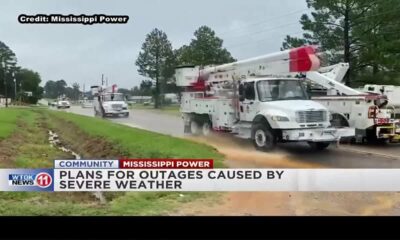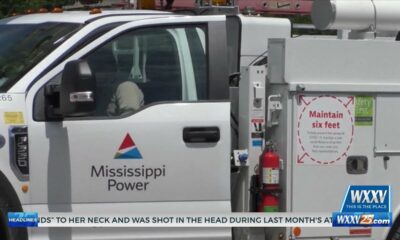Mississippi News
What’s causing the state’s slow shift to renewable energy?
The market, not climate concerns, is driving Mississippi's slow push for renewable energy
Mississippi, a state where natural gas dominates the energy supply, may soon be turning a corner in its transition to clean and renewable energy. But amid a global effort to reduce the future impacts of climate change, the state is letting the market, not emissions, dictate that shift.
The U.S. as a whole generates about 20% of its power from renewables, which includes wind, hydropower, solar and biomass, such as wood or plants. Renewable energy sources replenish themselves more quickly than traditional energy sources like oil, gas and coal, and significantly reduce emissions that are harmful to the environment.
But in Mississippi, renewable energy generates little, if any, political excitement: A little over 2% of the net electricity utilities generate comes from renewable sources, according to the latest federal data from 2021. State lawmakers have largely ignored the climate debate, even while other state legislatures tackle the issue directly.
But all that is slowly changing in this deeply conservative state. Last November, the state's largest utility company — Entergy Mississippi — committed to source almost a third of its power from renewables by 2027.
Entergy and other power companies are embracing such a drastic shift largely because producing renewables, especially solar energy, costs a small fraction of what it did just a decade ago. Since 2009, solar power costs have dropped about 90%, and are now cheaper than natural gas, coal and nuclear energy production.
The state's Public Service Commission has approved several new solar projects since 2020, which combined would more than double the state's solar capacity. The PSC is also developing programs to give renters and homeowners the ability to generate and sell their own solar power — it's currently taking comments on an expanded net metering rule until Feb. 8, and is also starting the process to create a new community solar program.
!function(){“use strict”;window.addEventListener(“message”,(function(e){if(void 0!==e.data[“datawrapper-height”]){var t=document.querySelectorAll(“iframe”);for(var a in e.data[“datawrapper-height”])for(var r=0;r Simon Mahan, executive director of the Southern Renewable Energy Association, said he's encouraged by the PSC's recent work around renewables, which includes requiring utilities to submit annual forecasts of their future energy needs, also called Integrated Resource Plans. Mahan believes that Mississippi could soon set itself apart from other Southeastern states in its transition.
“Had you and I had this conversation a year ago, things would be really different,” he said. “But now we're starting to see things really take off in the state, in part again because we've got good commissioners in Mississippi, we've just gone through a good process, and utilities are starting to really value renewables.
“Mississippi isn't a (renewable energy) leader just yet, but it's on its way.”
But clean energy advocates argue that the market-based approach is not enough, and that emissions need to play a bigger role in the state's energy decision-making. Jennifer Crosslin, a regional organizer for the Gulf Coast Center for Law & Policy, explained that data from the Intergovernmental Panel on Climate Change (IPCC) shows the need to drastically reduce greenhouse gas emissions by 2030 to avoid the worst effects of global warming. In the U.S., a quarter of those emissions come from the energy sector.
“We are way behind nationally, and then we look within the nation, we're even further behind as a state,” Crosslin said.
She pointed to the way investor-owned utilities, including Entergy and Mississippi Power are structured, where their profit comes from what they spend on new projects, and lacks incentives to lower emissions.
“The way that (investor-owned utilities) are currently structured is not moving the needle fast enough,” she said. “That market-based approach is not working at all. It's time for the state to step in.” Looking at rising sea-levels and more powerful storms, studies project that Mississippi, along with the other Gulf states, will be one of the hardest-hit parts of the country when it comes to climate change.
Northern District Public Service Commissioner Brandon Presley, the longest-serving of the three elected PSC leaders, explained that the economy, not environmental impacts, will always steer the conversation in Mississippi.
“You have a better chance of getting these projects done because of the economic development side of it than trying to argue the merits of emissions,” Presley said.
Last month, Presley approved a new solar facility in Union County, which will power a Toyota manufacturing plant in Blue Springs.
Central District Public Service Commissioner Brent Bailey, a Republican, echoed his Democrat colleague's sentiment. “You do get the environmental aspect as well,” Bailey said, “but being in Mississippi, you know that's not the primary driver for a lot of this, in my view. It's always going to get back to the economic benefits first.”
Most states, as well as the District of Columbia, have what's called a renewable portfolio standard (RPS), which requires that a certain share of its power generated comes from renewable sources by a certain date. Thirty states have an RPS, and another eight have a non-enforceable version of it. Mississippi is one of twelve states, including all of its neighbors and most of the South, with neither.
Presley contended that trying to pass an RPS in Mississippi is, politically speaking, a pointless effort. In most cases, RPS' are adopted through the state Legislature.
“It wasn't politically, practically, going to happen,” he said. “If it wasn't going to get done, why would we waste time chasing rabbits we're not going to catch?” Presley added that the state was at a disadvantage in terms of being an early renewable adopter; creating new facilities often means costs get passed down to customers, which in Mississippi means spreading those costs among fewer and poorer ratepayers than in most states.
Mahan, who works with renewable developers across the Southeast, said RPS' in other states are in part why renewable costs are so much lower now. Such a policy forces utilities to consider environmental benefits, and not just cost, he added; as it stands in Mississippi, no part of the state's future resource planning requires power companies to weigh the emissions of different sources.
But he also said Mississippi is moving in the right direction regardless. Georgia, for instance, is seeing a surge in renewable capacity despite no legislated mandates.
“The renewable industry has shown up in the state because we believe it's going to be a good state to do business in,” he said. “Could it have been faster with an RPS? Maybe. But again, the economics of the projects alone is what's driving the interest in the state and the growth in Mississippi.” Commissioner Bailey, who's spent time visiting different schools in his district that have added rooftop solar panels, admitted that he hasn't had much discussion with state lawmakers about creating new renewable incentives. Rather, he feels confident about the market-driven approach, and is excited about the economic spark renewables could bring to Mississippi.
“We're excited about the opportunity, we're excited about the investments at the local level, the revenues that can be obtained from that, and hopefully leveraging and attracting new industry to the state,” he said. “You want your state, your community, your area to be seen as innovative, and I think these are some measures that allow that.”
This article first appeared on Mississippi Today and is republished here under a Creative Commons license.
Mississippi News
Lafayette softball shuts out New Hope in game one of 5A quarterfinals
SUMMARY: Lafayette softball defeated New Hope 3-0 in game one of the 5A quarterfinals, with Mabry Claire Eason pitching a complete game shutout. Tashika Carothers hit a shallow fly ball to center field, scoring Eason and Mary Madison Kelley to get the Commodores' bats rolling early. The two teams will meet again in the next game, where Lafayette can clinch a spot in the semifinals with a win while New Hope is in a win or go home situation. The game is set for Saturday at 6 PM at Lafayette.
The post Lafayette softball shuts out New Hope in game one of 5A quarterfinals appeared first on www.wcbi.com
Mississippi News
Medicaid expansion efforts collapse in Mississippi
SUMMARY: Efforts to expand Medicaid to 200,000 Mississippians died during the 2024 Legislative Session due to breakdown in negotiations between House and Senate leaders. A new proposal for a ballot referendum was introduced, causing a compromise measure to fall apart. The compromise would have provided healthcare coverage to those making up to 138% of the federal poverty level, with a work requirement. House Democrats opposed the measure, and there were doubts about the Senate's approval. Mississippi remains one of 10 states that have not expanded Medicaid. Both House and Senate leaders have indicated that Medicaid expansion may be considered in the future.
The post Medicaid expansion efforts collapse in Mississippi appeared first on www.wjtv.com
Mississippi News
Mississippi Republicans revive bill to regulate transgender bathroom use in schools
SUMMARY: Mississippi's Republican-led Legislature revived a bill to regulate transgender people's restroom use, requiring single-sex facilities in public education buildings. The legislation would mandate using spaces corresponding to sex assigned at birth. Democrats opposed the bill, citing risks to transgender individuals. Advocacy groups mobilized Republican women to support the bill, which ultimately passed with weaker penalties than originally proposed. The bill follows other Mississippi laws banning transgender athletes in sports and gender-affirming care. Republican legislators defend the bill as protecting female privacy on college campuses. The issue is part of a broader national trend of Republicans restricting transgender rights in state legislatures.
The post Mississippi Republicans revive bill to regulate transgender bathroom use in schools appeared first on www.wjtv.com
-
Mississippi Today5 days ago
On this day in 1951
-
Mississippi News6 days ago
One injured in Mississippi officer-involved shooting after chase
-
SuperTalk FM3 days ago
Festival merger in Leland sets up one major event for Mississippi Delta
-
SuperTalk FM4 days ago
PERS bill set to phase in employer rate increase heads to governor’s desk
-
Mississippi Business2 days ago
Geartek expanding operations in Alcorn County
-
Mississippi News3 days ago
Two women accused of shoplifting across southeast captured in Mississippi
-
SuperTalk FM6 days ago
Investigation underway after gun found in backpack of Ridgeland High School student
-
SuperTalk FM11 hours ago
Driver’s education set to become mandatory in Mississippi as bill passes















































